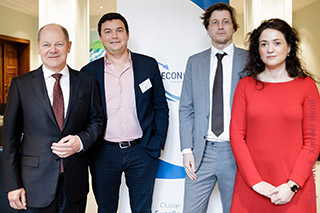The richest 50 percent of Germans have doubled their wealth since reunification - the poorest 50 percent have gained practically nothing. This is shown by the new study "The Distribution of Wealth in Germany from 1895 to 2018" by the ECONtribute Cluster of Excellence of the Universities of Bonn and Cologne. It is the first comprehensive analysis of long-term wealth inequality in Germany. The results are based on historical tax data, studies and surveys as well as wealth rankings of the last 125 years. The Vice Chancellor and Federal Minister of Finance Olaf Scholz accepted the study today in Berlin.
The gap between rich and poor is growing wider and wider: this is the conclusion of a new study by the ECONtribute Cluster of Excellence: Markets & Public Policy around a research team of the Bonn economist Prof. Dr. Moritz Schularick. Since Germany’s reunification, the upper middle class has become significantly richer - while the poor have remained poor. Since 1993, the richest 50 percent of Germans have been able to double their real wealth, but in contrast, the poorest 50 percent have gained almost nothing in wealth. The share of total wealth held by the lower 50 percent of Germans has actually almost halved since 1993.
Above all, the stock and real estate boom has led to this development: For anyone who owns a house, an apartment or other assets - and previously had enough assets on their side to afford them - has been able to benefit from the rising prices over the past decade. Households in the lower distribution of wealth have almost missed out on this development.
Commenting on the study in Berlin, French economist Thomas Piketty Professor at the Paris School of Economics said: "It is clear that wealth disparities remain extremely high and have been increasing since the 1990s. The limited access to property and economic participation of the lower half of the population and the high concentration of wealth and economic power at the top should be a cause of concern for Germany and Europe as a whole".
The gap between rich and poor is supported by further figures: While in 1993 the top ten percent of households were on average 50 times richer than the bottom 50 percent, this figure also doubled by 2018.
"For a clever and well thought-out policy, a solid stock-taking is indispensable," Federal Minister of Finance Olaf Scholz praised the study on Thursday. "With the first comprehensive long-term study on the development of wealth inequality in Germany, Moritz Schularick and his co-authors are making an important contribution to the economic and socio-political debate. Social cohesion can only succeed if everyone participates in the growth and success of our society.“
Current statistics also underestimate the total assets of German households. In particular, the many corporations and quasi-corporations are statistically underestimated in Germany. "If you apply international valuation methods, we see that German business assets amounted to around four trillion euros in 2018 and real estate assets to more than nine trillion euros. This means that German business assets have been undervalued by up to two trillion euros," study author Schularick explains the results.
The study was conducted within the framework of ECONtribute, the only economic cluster of excellence funded by the German Research Foundation (DFG) - supported by the universities of Bonn and Cologne. The cluster conducts research on markets at the interface between business, politics and society.
- Summary of the study
- Reinhard Selten Institute
- The entire study is available on the website of the Reinhard Selten Institute
About ECONtribute: Markets & Public Policy
"ECONtribute: Markets & Public Policy" is the only economic DFG Cluster of Excellence nationwide. It is supported by the Rheinische Friedrich-Wilhelms-Universität Bonn and the University of Cologne. The cluster conducts research on markets at the interface between business, politics and society. The aim of ECONtribute is to better understand markets and to find a fundamentally new approach to the analysis of market failures that meets today's social, technological and economic challenges, such as increasing inequality and political polarization or global financial crises.
